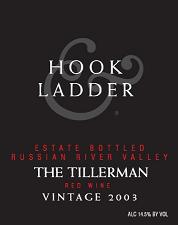 |
|
Wine Details
Price:
$17.00 per bottle
Description:
Cabernet Sauvignon, Cabernet Franc and Sangiovese are given the royal treatment in this Russian River Valley red blend. We got what we wanted: an enthusiastic burst of ripe fruits, a seductive combination of luring aromas that only start with berry, cassis, spice and leather, and a wine whose texture is smooth, juicy and long.
|
|
Varietal Definition
Cabernet Franc:
Cabernet Franc is an accessible, spicy, herbal, dark blue grape variety that is often compared to Cabernet Sauvignon. Cabernet Franc tends to be softer and has less tannin than Cabernet Sauvignon, although the two can be difficult to distinguish. Sometimes the French refer to Cabernets, which could mean either of the two grapes. Its typical aromas include an herbaceous and pronounced peppery nose, even in ripe fruit, and something eerily like tobacco. The Cabernet Franc ripens at an earlier stage, which gives it reason to exist in the Bordeaux area. In the Loire, where we find it a lot, it gives a clear red fresh and fruity wine.
|
Cabernet Sauvignon:
Cabernet Sauvignon is the most widely planted and significant among the five dominant varieties in France’s Bordeaux region, as well as the most successful red wine produced in California. Though it was thought to be an ancient variety, recent genetic studies at U.C. Davis have determined that Cabernet Sauvignon is actually the hybrid offspring of Sauvignon Blanc and Cabernet Franc. Cabernet Sauvignon berries are small with black, thick and very tough skin. This toughness makes the grapes fairly resistant to disease and spoilage and able to withstand some autumn rains with little or no damage. It is a mid to late season ripener. These growth characteristics, along with its flavor appeal have made Cabernet Sauvignon one of the most popular red wine varieties worldwide.
|
Sangiovese:
Sanguis Jovis, the Latin origin for the varietal name, literally means “blood of Jove.” Sangiovese is one of the oldest known varietals and it is likely that ancient Etruscan winemakers cultivated it, although the first literary reference to Sangiovese was in 1722. Sangiovese is probably indigenous to Tuscany, whose most famous wine is Chianti. Chianti is a blend that currently contains a minimum of 90% Sangiovese.Sangiovese thrives in hot dry climates. Because these climatic criteria generally enhance quantity, rather than quality, it takes careful cultivation and winemaking techniques to produce really excellent wine from this grape.
|
|